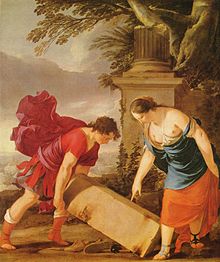Theseus (Greek: Θησεύς) was the legendary founder-king of Athens, son of Aethra, and fathered by Aegeus and Poseidon, both of whom Aethra lay with in one night. Theseus was a founder-hero, like Perseus, Cadmus or Heracles, all of whom battled and overcame foes that were identified with an archaic religious and social order.[1] As Heracles was the Dorian hero, Theseus was the Ionian founding hero, considered by Athenians as their own great reformer. His name comes from the same root as θεσμός ("thesmos"), Greek for institution. He was responsible for the synoikismos ("dwelling together")—the political unification of Attica under Athens, represented emblematically in his journey of labours, subduing highly localized ogres and monstrous beasts. Because he was the unifying king, Theseus built and occupied a palace on the fortress of the Acropolis that may have been similar to the palace that was excavated in Mycenae. Pausanias reports that after the synoikismos, Theseus established a cult of Aphrodite Pandemos ("Aphrodite of all the People") and Peitho on the southern slope of the Acropolis. In The Frogs, Aristophanes credited him with inventing many everyday Athenian traditions. If the theory of a Minoan hegemony[2] is correct, he may have been based on Athens' liberation from this political order rather than on an historical individual. Plutarch's vita of Theseus makes use of varying accounts of the death of the Minotaur, Theseus' escape and the love of Ariadne for Theseus, in order to construct a literalistic biography, a vita.[3] Plutarch's sources, not all of whose texts have survived independently, included Pherecydes (mid-sixth century), Demon (ca 300), Philochorus and Cleidemus (both fourth century).[4] Aegeus, one of the primordial kings of Athens, found a bride, Aethra who was the daughter of king Pittheus at Troezen, a small city southwest of Athens. On their wedding night, Aethra waded through the sea to the island Sphairia that rests close to the coast and lay there with Poseidon (god of the sea, and earthquakes). By the understanding of sex in antiquity, the mix of semen gave Theseus a combination of divine as well as mortal characteristics in his nature; such double fatherhood, one father immortal, one mortal, was a familiar feature of Greek heroes.[5] When Aethra becamepregnant, Aegeus decided to return to Athens. But before leaving, he buried his sandals and sword under a huge rock[6] and told her that when their son grew up, he should move the rock, if he were hero enough, and take the tokens for himself as evidence of his royal parentage. At Athens, Aegeus was joined by Medea, who had fled Corinth after slaughtering the children she had borne Jason, and had taken up a new consort in Aegeus. Priestess and consort together represented the old order at Athens. Thus Theseus was raised in the land of his mother. When Theseus grew up and became a brave young man, he moved the rock and recovered his father's arms. His mother then told him the truth about his father's identity and that he must take the weapons back to the king and claim his birthright. To get to Athens, Theseus could choose to go by sea (which was the safe way) or by land, following a dangerous path around the Saronic Gulf, where he would encounter a string of six entrances to the Underworld,[7] each guarded by a chthonic enemy in the shapes of thieves and bandits. Young, brave and ambitious, Theseus decided to go alone by the land route, and defeated a great many bandits along the way. Each of these sites was a very sacred place already of great antiquity when the deeds of Theseus were first attested in painted ceramics, which predate the literary texts.Contents
[hide][edit]Early years
[edit]The Six Entrances to the Underworld
[edit]


